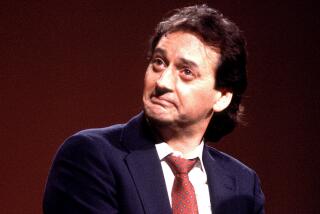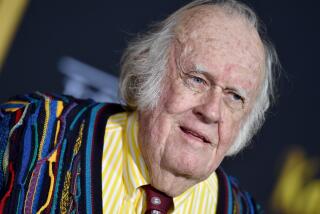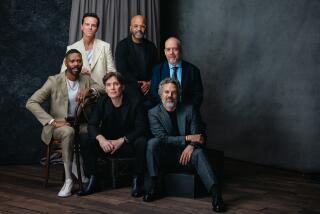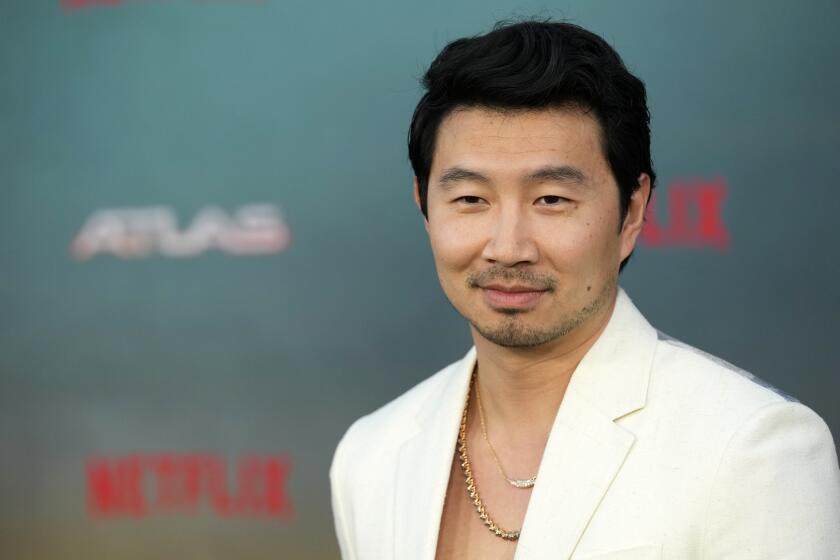Farnsworth a Natural for ‘Straight Story’
Richard Farnsworth shows up at the L.A. Equestrian Center looking every inch the cowboy, from his broad-brimmed hat to his crisp blue jeans to his handsome leather boots. On his right hand, he wears a huge turquoise ring.
The setting seems appropriate for an interview with Farnsworth; he’s been riding horses his whole life, from his boyhood in L.A. to his days as a rodeo performer and movie stuntman. The Equestrian Center was one of Farnsworth’s old stomping grounds.
“This was the river bottom,” the 79-year-old actor says, staring out the window of a small reception area. “We had [horse] races here in the late ‘30s, all the way up to the early ‘50s,” he says. “I kept my horses here up until 1989. I can’t ride now [he has a bad hip], but I keep them as pets.”
So it’s ironic that in perhaps the role of his 60-plus-year movie career, Farnsworth is riding again, but instead of a horse, he’s on a beat-up John Deere lawn mower. And instead of Western plains and mountains, he’s traveling along rolling state highways through the Midwest.
The film is “The Straight Story,” and in it Farnsworth plays Alvin Straight, who travels for six weeks on his lawn mower to visit his estranged older brother who has suffered a stroke. The elegiac drama, directed by David Lynch--his first G-rated film--is based on a true story.
Farnsworth says it was easy for him to fit into Straight’s shoes. For one thing, both men relied on canes to get around.
“I saw the condition he was in,” he explains in his gentle, rather high-pitched voice. “It kind of gives you a feeling of what he went through sitting on the [mower] every day. It wasn’t very hard for me to do frankly. Even the dialogue seemed to go so smooth for me. I am kind of limited [as an actor]. I do rural things. I couldn’t do a Philadelphia lawyer or a nuclear physicist. But the way it was written, it just felt fine.”
Farnsworth’s subtle, moving performance won raves at film festivals and generated talk of an Oscar nomination. The Disney film opens today.
“He doesn’t consider himself an actor, which is a real shame,” says Lynch, who’s best known for such violent cult classics as “Blue Velvet” and “Eraserhead.” “As many times as I told him he’s full of baloney, he probably never will believe it. He started out in rodeo and stunts and came to acting [late]. He doesn’t realize what a gift he has, which is the gift of a true actor. He’s got it.”
Because of his bad hip, says Lynch, Farnsworth was in a lot of pain during the shoot. “A lot of times we had to help him get out of the chairs,” he says. “His hips wouldn’t let him. But actually he got younger as the movie progressed. Toward the end, he was getting up out of chairs he wouldn’t have gotten out of at first.”
Sissy Spacek, who plays Straight’s childlike daughter, Rose, felt Farnsworth really was like the character he played, making it easy for her to bond with him both on and off screen.
“They don’t make men like him any more,” she says with much affection. “He is very funny and a very humble man. There are some people that you feel awkward about even touching and he’s not one of them.”
Because the film follows Straight’s route from Iowa to Wisconsin, Farnsworth got to meet a lot of the people who helped him on his journey back in 1994. “They had a good word to say for the old man,” he says. “He was very independent. He might not have had any money, but he didn’t want anyone to know about it.”
Before the film began, Farnsworth asked Lynch why Straight just didn’t take a bus to visit his brother. “David said he made up his mind that this was his last big chore and he’s going to do it on his own,” Farnsworth says of Straight, who died in 1996. “He was a very hard-headed old guy. I might have played him a little softer than he was.”
From his Oscar-nominated role in 1978’s “Comes a Horseman” to his acclaimed performance in 1983’s “The Grey Fox” to “Straight Story,” Farnsworth has demonstrated an uncanny ability to express more emotion with his face than in reciting pages of dialogue. With his twinkling blue eyes, white hair and mustache, and leathery but still handsome face, Farnsworth calls to mind such old western film stars as William S. Hart.
Even when Farnsworth speaks dialogue, Lynch says, “a word starts inside of him and by the time it comes out, he has made it is own. He’s made it real. He has colored it with a facial expression and something in the eyes. It becomes just kind of a magic act.”
The most memorable and emotional scene in the film is when Straight and an elderly gentleman he’s met on his travels have a drink in a local bar and talk about the horrors they endured during World War II. The camera lingers on Farnsworth’s haunted face as his eyes tear up during his monologue. The sequence ends up being almost as powerful in its own way as the D-Day battle scenes in “Saving Private Ryan.”
Farnsworth is mum about his World War II experiences. “I don’t talk about the war,” he says, gently nudging the leg of the reporter with his cane. “It’s a bad thing.”
“I didn’t have any trouble doing this scene, I’ll tell you. The way it was written. I think the scene went well. I got a little bit misty-eyed during part of it. I wasn’t acting.”
“The Straight Story” screened at the Cannes film festival in May. Farnsworth was overcome with emotion at the standing ovation he received.
“It was thrilling,” he recalls. “The standing ovation really got to me, I tell you. It went on and on. I couldn’t get over it.”
“It was very intense and beautiful,” echoes Lynch. “It was as if there was no festival. There was just a roomful of people [applauding].”
Farnsworth began his movie career as an extra in the 1938 costume epic “The Adventures of Marco Polo.” Being a stuntman in Hollywood in those days, he says, was wonderful. “I was an athlete. I found out early in my career I wasn’t accident prone. I didn’t want to do anything but stunt work.”
Farnsworth, in fact, was Montgomery Clift’s stunt double on the 1947 western classic “Red River. “Monty and I were about the same size,” says the 6-foot Farnsworth. “We looked quite similar.” Farnsworth spent two weeks teaching Clift how to roll a cigarette, wear a hat and ride a horse.
“In all fairness, he looked pretty darn good,” he says. “I don’t think he had even been on a horse. I was pretty proud actually, how it turned out for him, like he was a cowboy.”
Worked With Fonda, McCrea, Douglas
Henry Fonda, whom he doubled in the 1948 John Ford western, “Fort Apache,” was his favorite actor to work with. “He was a loner but I liked his style. I like Joel McCrea. I worked with Joel quite a bit. What a gentleman.”
Farnsworth was also a gladiator in Stanley Kubrick’s epic “Spartacus.”
“They had the USC football team out there to be interviewed to do the gladiators, but Kirk Douglas wanted slim guys around because he really isn’t a big man,” he recalls. “We had these ponytails in the back and I was really skinny. I had this short skirt with sandals. I was embarrassed to heck.”
Farnsworth did try his hand at acting, with disastrous results, in 1945 on a Roy Rogers movie. The director asked if he wanted to say a few lines to make some extra money. Playing a tough hombre, he was supposed to say to his partner in crime, “‘This is more than I bargained for, Slate.”
“I gave it my best sneer,” he says. “But I broke up and laughed. I said to the director, ‘Give me another chance.’ This time it was worse. The director said, ‘Dick, we got to get this shot sometime today.’ I tell you I was demoralized. I was just embarrassed with my friends standing around and laughing.”
He didn’t try to do dialogue again for years. The only reason he was considered for the role of Jane Fonda’s dedicated ranch hand in “Comes a Horseman” was that director Alan Pakula had previously produced the 1969 Gregory Peck western “The Stalking Moon,” in which Farnsworth uttered a few lines as a cavalry soldier.
Pakula remembered Farnsworth’s brief scene. “They called me in and showed me the script. I said, ‘Look there’s too much here.’ They said to take it home. I took it home and my wife, Margaret, looked at it and said, ‘You can do this. We’ll practice.’ They called me in a couple of days later and I read one scene with Jane. Alan said, ‘That’s it.’ I got the job.”
Farnsworth’s eyes twinkle. “When the acting came up, it was a miracle,” he says. “I was about to retire and had I not gotten the nomination, I would have been out of the business.”
More to Read
Only good movies
Get the Indie Focus newsletter, Mark Olsen's weekly guide to the world of cinema.
You may occasionally receive promotional content from the Los Angeles Times.











